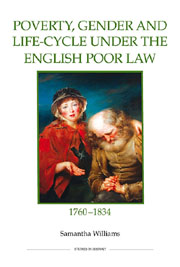Book contents
- Frontmatter
- Contents
- List of figures
- List of tables
- Dedication
- Acknowledgements
- Abbreviations
- Map 1 Bedfordshire, c.1834
- Introduction
- 1 People, place and poverty
- 2 Policy and paupers
- 3 Paying for poverty
- 4 Gender, life-cycle and the life-course
- 5 Work, unemployment and the makeshift economy
- Conclusion
- Bibliography
- Index
Conclusion
Published online by Cambridge University Press: 05 February 2013
- Frontmatter
- Contents
- List of figures
- List of tables
- Dedication
- Acknowledgements
- Abbreviations
- Map 1 Bedfordshire, c.1834
- Introduction
- 1 People, place and poverty
- 2 Policy and paupers
- 3 Paying for poverty
- 4 Gender, life-cycle and the life-course
- 5 Work, unemployment and the makeshift economy
- Conclusion
- Bibliography
- Index
Summary
This book has sought to provide a highly detailed study of the poor and their families during the ‘crisis’ period of the old poor law, its findings based upon the detail available from the assembly of pauper biographies. Campton and Shefford have been placed ‘under the microscope’ in order to explore the nature and scope of poor relief in a period of increasing economic and social strain. Micro-history and the local have been used as the site for the consideration of much wider issues, questions that can only be addressed adequately by analysis at the parochial, familial and individual level.
A number of conclusions can be drawn about the role of poor relief at the local level. The first is that the growth of social welfare, which has been identified by other historians for the later seventeenth and eighteenth centuries, continued. Expenditure on the poor in Campton and Shefford rose rapidly from the later eighteenth century, as did the number of both pensioners and occasional recipients. The most valuable form of relief was the regular weekly cash pension. Although the proportion of relief spent on pensions declined, the commitment of both communities to pension payments remained high, accounting for at least 70 per cent of parish spending. Overseers up-rated top pensions and pushed more pensioners into higher pension brackets. The welfare safety net was thrown ever wider, to incorporate male heads of families during the economic crises of 1799–1802 and 1815–22 and unemployed men and boys after 1813, without squeezing out the elderly poor and lone parents, both categories which were deemed the most deserving recipients of pensions.
- Type
- Chapter
- Information
- Publisher: Boydell & BrewerPrint publication year: 2011



